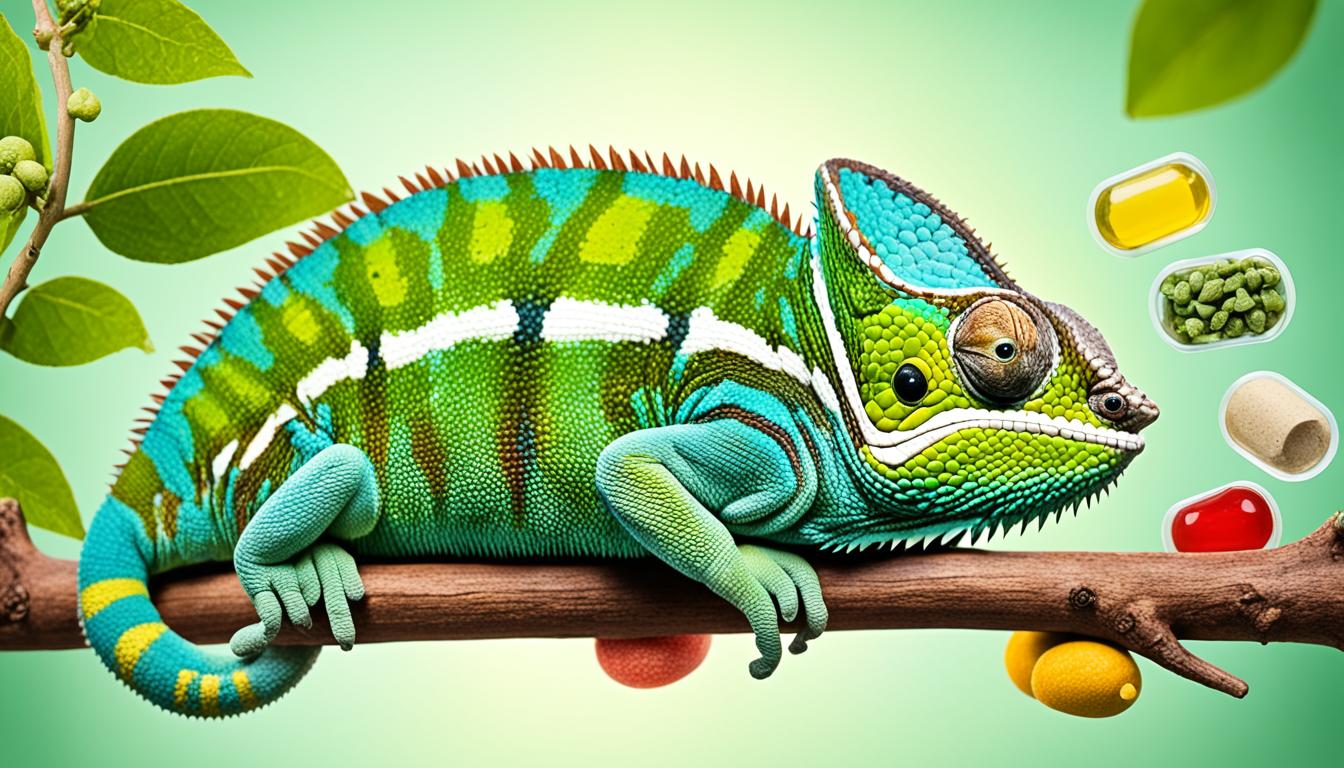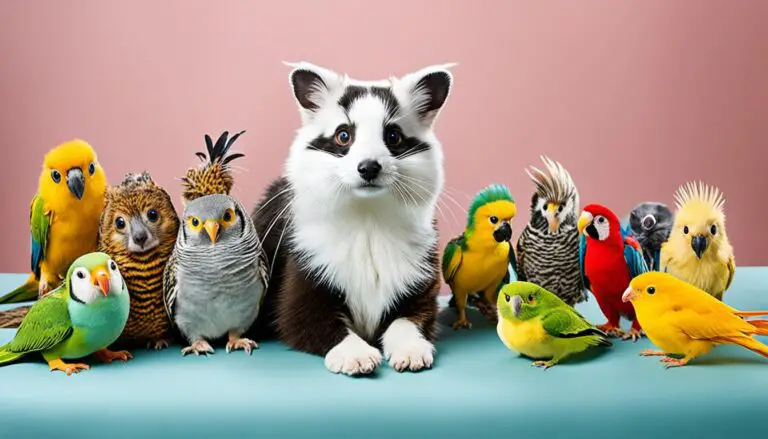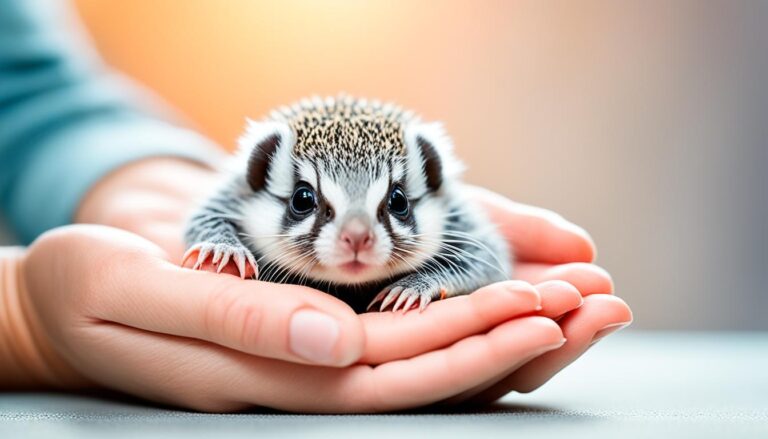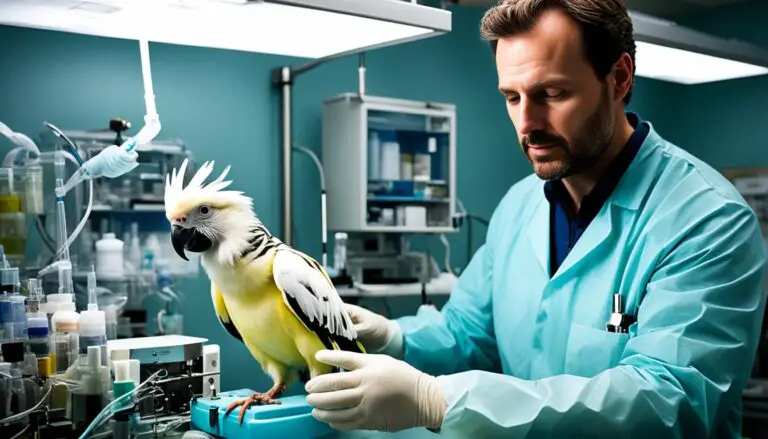Exotic Pet Metabolic Disorders: Care Tips
Exotic pets, such as reptiles, birds, and small mammals, have unique metabolic needs that require specialized care. Managing metabolic disorders in exotic pets involves addressing their specific diet and nutrition, housing and environmental requirements, legal considerations, limited access to veterinary care, and socialization and behavioral challenges that may arise.
- Exotic pets have unique metabolic needs that must be met through specialized care.
- Proper diet and nutrition are crucial for preventing metabolic disorders in exotic pets.
- Meeting their specific housing and environmental requirements is essential for their well-being.
- Understanding the legal considerations and permits for owning exotic pets is important.
- Accessing appropriate veterinary care for exotic pets can be challenging and requires research.
Importance of Specialized Diet and Nutrition for Exotic Pets
Exotic pets, such as reptiles, amphibians, and other unique animals, have specific dietary needs that differ significantly from traditional pets like cats and dogs. These fascinating creatures require a specialized diet and nutrition plan to maintain their optimal health and well-being. Failing to provide them with the appropriate diet can lead to various health issues, including metabolic disorders.
When it comes to exotic pets, like reptiles, a specific balance of nutrients, including vitamins, minerals, and protein, is crucial for their overall health and longevity. These specialized dietary requirements are essential to meet their unique metabolic needs and prevent the occurrence of metabolic disorders.
Consulting with an exotic pet vet or a reputable pet store can provide valuable recommendations specific to your exotic pet’s dietary needs. They can provide guidance on feeding schedules, appropriate diet composition, and necessary supplements to ensure your pet receives the nutrition it requires.
Proper nutrition is fundamental in maintaining the health and well-being of exotic pets. Failure to meet their dietary needs can lead to various health issues, including metabolic disorders that can pose significant risks to their overall quality of life.
Exotic Pet Diet:
When it comes to the dietary needs of exotic pets, there is no one-size-fits-all approach. The type of diet your exotic pet requires greatly depends on its species and natural feeding habits. Some exotic pets are herbivores, while others are omnivores or carnivores. Understanding their dietary preferences and providing a balanced diet is vital for their overall health and vitality.
Here are some general guidelines to consider for each category:
| Exotic Pet Type | Dietary Considerations |
|---|---|
| Herbivores |
|
| Omnivores |
|
| Carnivores |
|
It’s important to note that every exotic pet is unique, and their dietary needs may vary. Consulting with an exotic pet specialist is crucial to ensure you’re providing the best diet and nutrition for your particular pet.

By prioritizing the specialized diet and nutrition of your exotic pet, you can contribute to its overall well-being and prevent the onset of metabolic disorders or other health complications. Always remember to consult with professionals who specialize in exotic pet care to ensure you’re providing the best possible diet and supplementation for your unique companion.
Meeting Unique Housing and Environmental Needs
Creating a suitable habitat is essential for the well-being of exotic pets. Each species has unique housing and environmental requirements that must be met to ensure their health and happiness. Here are some key considerations when providing housing for your exotic pet:
Research and Preparation
Before bringing an exotic pet home, it is crucial to research and understand their specific housing needs. This includes knowledge of their natural habitat, environmental conditions, and behavioral patterns. By gathering this information, you can provide a suitable environment that closely resembles their natural surroundings, promoting their overall well-being.
Space and Enrichment
Exotic pets, such as birds and reptiles, need ample space to move, exercise, and explore. For birds, providing a spacious cage with enough room for flying and perching is essential. Reptiles may require terrariums or enclosures that accommodate their size and allow for activities like climbing and basking. Additionally, enrichment items, such as branches, toys, and hiding spots, should be provided to stimulate their natural behavior and prevent boredom.
Temperature and Lighting
Some exotic pets have specific temperature and lighting requirements to maintain their metabolic functions. Reptiles, for example, may need heat lamps or under-tank heaters to create a warm spot for thermoregulation. UVB lighting is crucial for reptiles and some birds to synthesize vitamin D3, which is essential for calcium absorption and overall health. It is important to invest in appropriate heating and lighting equipment to provide a comfortable and suitable environment for your pet.

Humidity and Moisture
Certain exotic pets, like amphibians and tropical birds, require specific humidity levels and access to water sources. Monitoring and maintaining appropriate humidity levels in their enclosure is crucial for their respiratory health and skin condition. Providing bathing areas, misters, or maintaining a water dish can ensure they have access to the moisture they need.
Consult Experts
If you are unsure about the ideal housing and environmental requirements for your exotic pet, it is recommended to consult with exotic pet veterinarians or reputable pet stores specializing in exotic animals. They can provide valuable insights and recommendations based on their expertise and experience.
By meeting the unique housing and environmental needs of your exotic pet, you can create a safe and comfortable living space that promotes their overall well-being and allows them to thrive.
Legal Considerations for Owning Exotic Pets
When considering owning an exotic pet, it is crucial to be aware of the legal requirements and restrictions associated with exotic pet ownership. Laws regarding exotic pets can vary by region, so it is essential to research the specific laws in your area to ensure compliance and avoid potential legal trouble.
Some exotic pets may require permits or licenses to be legally owned. These permits are designed to regulate the ownership and ensure the well-being of the animals. Failure to obtain the necessary permits or licenses can result in fines or even the confiscation of the pet.
Consulting with an exotic pet vet or a reputable pet store knowledgeable in exotic pet ownership can provide valuable guidance on the legal requirements for exotic pets. They can help you navigate the complex landscape of exotic pet ownership laws and provide recommendations for legal exotic pets that meet your desires and circumstances.
Here is an overview of the key legal considerations for owning exotic pets:
- Research the specific laws and regulations governing exotic pet ownership in your region.
- Identify whether permits or licenses are required for the exotic pet species you are interested in owning.
- Understand the application process for obtaining the necessary permits or licenses.
- Ensure compliance with any zoning restrictions or special requirements for housing exotic pets.
- Verify if there are any limitations on the number or types of exotic pets allowed.
By understanding and adhering to the legal requirements for owning exotic pets, you can enjoy the companionship of these unique animals while also ensuring their well-being and your compliance with the law.
| Key Points | Legal Considerations for Owning Exotic Pets |
|---|---|
| Exotic Pet Ownership Laws | Research the laws and regulations in your region |
| Legal Requirements | Permits or licenses may be required |
| Permits for Exotic Pets | Understand the application process for obtaining permits |
| Housing Restrictions | Zoning restrictions and special housing requirements may apply |
| Limits on Exotic Pet Ownership | Verify any limitations on the number or types of exotic pets allowed |

Limited Access to Veterinary Care for Exotic Pets
Exotic pets require specialized veterinary care that not all vets can provide. Finding a vet who is knowledgeable and experienced with exotic pets can be challenging, and in some cases, pet owners may need to travel a considerable distance to access proper care.
When it comes to exotic pet veterinary care, accessibility is a crucial consideration. It’s essential to have a reliable expert who understands the unique needs of your exotic pet and can provide the necessary medical attention.
So, how can you find an exotic pet vet who can meet your pet’s specific needs? Here are a few tips:
- Research: Start by researching exotic pet vets in your area. Look for veterinarians who specialize in exotic animals or have experience treating them. Check their credentials and read reviews from other exotic pet owners to gauge their quality of care.
- Ask for Recommendations: Reach out to local pet stores that specialize in exotic animals or exotic pet owners in your community. They can often provide valuable recommendations based on their own experiences.
- Exotic Pet Associations: Look for professional associations or organizations dedicated to exotic pets. These groups often maintain lists of recommended veterinarians who specialize in exotic pet care.
- Consult with Local Zoos and Wildlife Centers: Zoos and wildlife centers frequently work with exotic animals and may have recommendations for exotic pet vets in your area.
Considering exotic pet insurance can also be a wise decision to help cover the cost of veterinary care for your unique companion. It provides financial protection and peace of mind, allowing you to focus on your pet’s health without worrying about the expenses.
Remember, it’s essential to find a vet who not only has the expertise to care for your exotic pet but also understands their specific needs. By taking the time to find the right veterinary care, you can ensure that your exotic pet receives the best possible treatment and lives a healthy, happy life.

Socialization and Behavioral Challenges of Exotic Pets
Exotic pets, just like traditional pets, benefit from socialization and training to become well-adjusted and friendly companions. However, it’s important to note that different species of exotic pets may present unique challenges in terms of socialization and behavior. Some animals may be naturally more solitary or territorial, making socialization a more intricate process.
When it comes to socializing exotic pets, consultation with experts in the field, such as exotic pet vets or knowledgeable pet store staff, is highly recommended. These professionals can offer valuable guidance on effective socialization techniques and provide access to behavioral training resources specific to exotic pets.
Exposing exotic pets to different environments, people, and animals from an early age can help them become more comfortable and adaptable. It’s essential to introduce new experiences gradually and positively reinforce desired behaviors with rewards and treats.
Table: Behavioral Challenges in Exotic Pets
| Exotic Pet Species | Common Behavioral Challenges |
|---|---|
| Parrots | Vocalization, feather plucking, social bonding issues |
| Reptiles | Aggression, stress-induced illness, enclosure dissatisfaction |
| Rabbits | Destructive chewing, territorial behavior, litter training difficulties |
| Sugar Gliders | Bonding issues, self-mutilation, aggression |
It’s important to remember that socialization and behavior training should always prioritize the well-being of exotic pets and not compromise their natural instincts or cause undue stress. Providing a safe and enriching environment, along with positive reinforcement methods, can help address behavioral challenges and ensure a healthy bond between owner and pet.
Understanding the Unique Needs of Exotic Pets
The exotic pet world is diverse, encompassing a wide range of species with varying behavioral traits and care requirements. Understanding the specific needs of each exotic pet species is crucial for successful socialization and behavioral management. It allows owners to cater to their pets’ individual needs, fostering a harmonious and rewarding relationship.
“Socialization plays a vital role in shaping the behavior of exotic pets, ensuring they thrive in a domestic environment. Patience, diligence, and professional guidance are key to addressing behavioral challenges and nurturing a positive bond.”
By investing time and effort into socialization and training, exotic pet owners can lay the foundation for a happy and fulfilling companionship with their extraordinary pets.
Importance of Proper Nutrition for Exotic Pets
Providing appropriate nutrition is key to promoting the health and well-being of exotic pets. Exotic pets have unique dietary needs that must be carefully met to prevent nutritional disorders and maintain optimal health. By understanding and addressing these nutritional considerations, you can ensure your exotic pet receives a balanced diet that supports their specific requirements.
When it comes to feeding exotic pets, it is essential to mimic their natural diet as closely as possible. Herbivorous species, such as tortoises or iguanas, need a diet rich in plant fiber, including leafy greens and vegetables. These foods not only provide essential nutrients but also help maintain their digestive health.
Omnivorous and carnivorous exotic pets, such as certain lizards or birds, have different dietary requirements. They need a diverse and balanced diet that includes both plant matter and animal proteins. It is important to ensure that these pets receive the necessary vitamins and minerals in their diet to support their overall health.
By researching the specific nutritional needs of your exotic pet, you can make informed decisions about their diet. Consulting with an exotic pet veterinarian or a reputable pet store can provide valuable guidance and recommendations for feeding your unique companion. They can offer insights into the ideal balance of nutrients and any necessary supplements to include in your pet’s diet.
Proper nutrition is crucial in preventing nutritional disorders in exotic pets. Imbalances or deficiencies in their diet can lead to a range of health issues, including metabolic disorders. These disorders can affect their overall well-being and may require specialized veterinary care to manage effectively.
By providing a balanced and appropriate diet, you can ensure your exotic pet receives the necessary nutrients for optimal health. Regular veterinary check-ups and ongoing monitoring of your pet’s nutritional status are also essential. Investing time and effort into understanding the nutritional considerations for exotic pets will contribute to their long-term health and well-being.
“Proper nutrition is the foundation of good health for exotic pets. By meeting their unique dietary needs, you can help prevent nutritional disorders and promote their overall well-being.”
Metabolic Bone Disease in Exotic Pets
Metabolic bone disease (MBD) is a common condition in exotic pets, particularly those with rapid growth rates. It occurs due to inadequate calcium and vitamin D3 levels in the diet, as well as improper calcium-phosphorus ratios. MBD can lead to various health issues such as soft shells, pathologic fractures, muscle tremors, and even death.
To prevent metabolic bone disease in exotic pets, it is crucial to take certain measures:
- Provide a diet with appropriate calcium levels: Exotic pets require a balanced diet that includes sufficient calcium. Consult with an exotic pet veterinarian or store to determine the right type of food and supplements for your pet’s species.
- Ensure proper UV lighting for vitamin D3 synthesis: Exposing your pet to natural or artificial UV lighting is essential for the synthesis of vitamin D3, which facilitates calcium absorption. This is particularly crucial for species that are unable to obtain vitamin D3 through their diet alone.
- Schedule regular veterinary check-ups: Routine check-ups with an exotic pet veterinarian are essential to monitor your pet’s overall health and detect any metabolic issues early on. Your vet can provide guidance on proper nutrition and assess the effectiveness of your pet’s current diet.
By following these preventive measures, you can help maintain the health and well-being of your exotic pet, reducing the risk of metabolic bone disease and other related disorders.
Common Symptoms of Metabolic Bone Disease
Metabolic bone disease can manifest through various symptoms in exotic pets, including:
- Soft or deformed shells in turtles and tortoises
- Pathologic fractures
- Muscle tremors or spasms
- Lameness or difficulty walking
- Loss of appetite
- Lethargy
If you observe any of these symptoms in your exotic pet, it is important to seek immediate veterinary attention. Early diagnosis and treatment can significantly improve the prognosis and quality of life for your pet.
Nutritional Considerations for Herbivorous, Omnivorous, and Carnivorous Exotic Pets
Different types of exotic pets have varying nutritional needs. Providing the right diet is essential for their overall health and vitality. Here are some key considerations for each category:
1. Nutrition for Herbivorous Exotic Pets
Herbivorous species, such as tortoises and rabbits, require a diet rich in plant fiber and calcium. Leafy greens, hay, and fresh vegetables should form the basis of their diet. Calcium supplements may be necessary to meet their calcium needs. Offering a variety of foods is important to ensure they receive a balanced mix of vitamins and minerals.
2. Nutrition for Omnivorous Exotic Pets
Omnivorous species, like certain reptiles and birds, have more varied dietary needs. They require a balance of plant and animal matter. Their diet should include a combination of leafy greens, fruits, insects, and small prey items. It is important to research the specific dietary requirements of your pet to provide them with optimal nutrition.
3. Nutrition for Carnivorous Exotic Pets
Carnivorous species, such as snakes and ferrets, have unique dietary needs. They require a diet that mimics their natural prey. Feeding them appropriately-sized whole prey or commercial diets designed for carnivores is crucial. Ensuring they receive the right balance of protein, fat, and nutrients is essential for their well-being.
It is important to note that self-prepared diets for exotic pets require careful consideration and may require consultation with an exotic pet veterinarian or nutritionist to ensure all nutritional needs are met.
Proper nutrition is key to promoting the health and well-being of exotic pets. Remember to consult with a knowledgeable exotic pet veterinarian or store to ensure you are providing the right diet for your unique companion. By meeting their nutritional needs, you can help them thrive and live a long, healthy life.
Conclusion
Caring for exotic pets requires a unique approach to ensure their health and well-being. By conducting thorough research, preparing adequately, and seeking guidance from experienced professionals, you can provide the optimal care for your exotic companion. From specialized diet and nutrition to meeting their unique housing and environmental needs, each aspect plays a crucial role in maintaining their overall health.
Understanding the legal considerations surrounding exotic pet ownership is also essential. Familiarize yourself with the laws in your area and ensure you have any necessary permits or licenses to avoid any legal complications. Furthermore, access to appropriate veterinary care for exotic pets may be limited, so finding a knowledgeable exotic pet vet in your area is crucial.
Additionally, addressing the socialization and behavioral challenges that may arise with exotic pets is vital. Seek guidance from an exotic pet vet or store on effective socialization techniques and consider investing in behavioral training resources to ensure your pet becomes a well-adjusted and friendly companion.
In conclusion, caring for exotic pets requires a holistic approach. By providing specialized care, understanding legal requirements, accessing appropriate veterinary services, and addressing behavioral needs, you can ensure the health and happiness of your beloved exotic pet. Remember to consult with professionals, consider exotic pet insurance, and prioritize the overall well-being of your unique animal companion.
FAQ
What are some important tips for managing metabolic disorders in exotic pets?
How can I ensure that my exotic pet is receiving the proper diet and nutrition?
What housing and environmental considerations should I keep in mind for my exotic pet?
What legal considerations are there for owning an exotic pet?
Is it difficult to find veterinary care for exotic pets?
How can I socialize and train my exotic pet?
Why is proper nutrition important for exotic pets?
What is metabolic bone disease and how can I prevent it in my exotic pet?
What nutritional considerations should I keep in mind for herbivorous, omnivorous, and carnivorous exotic pets?
What are the key takeaways for caring for exotic pets?
Source Links
- https://www.isvma.org/wp-content/uploads/2022/10/BonAppetitNutritionalConsiderationsforExoticPets.pdf
- http://www.exoticpetvet.com/metabolic-bone-disease-care.html
- https://www.amherstvh.com/post/5-unexpected-challenges-of-caring-for-exotic-pets
Peter Stones is the founder of Exotic Pets Place, the leading online resource for exotic pet care information.
With over 10 years of hands-on exotic pet ownership experience, he is deeply passionate about sharing his expertise to help others properly care for their unusual pets.
When he's not writing extensively researched articles or connecting with fellow exotic pet enthusiasts worldwide, you can find Peter at home tending to his own beloved menagerie of exotic animals.







